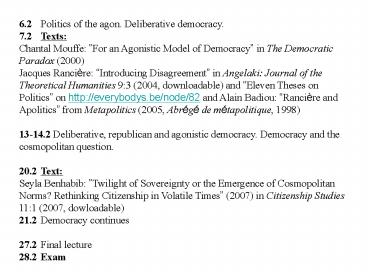6'2Politics of the agon' Deliberative democracy' - PowerPoint PPT Presentation
1 / 14
Title:
6'2Politics of the agon' Deliberative democracy'
Description:
a certain system: capitalism, liberal democracy, etc. ... hegemony of liberal democracy. supported by capitalist market economy. hegemony of democracy ... – PowerPoint PPT presentation
Number of Views:38
Avg rating:3.0/5.0
Title: 6'2Politics of the agon' Deliberative democracy'
1
6.2 Politics of the agon. Deliberative
democracy. 7.2 Texts Chantal Mouffe For an
Agonistic Model of Democracy in The Democratic
Paradox (2000) Jacques Rancière Introducing
Disagreement in Angelaki Journal of the
Theoretical Humanities 93 (2004, downloadable)
and Eleven Theses on Politics on
http//everybodys.be/node/82 and Alain Badiou
Rancière and Apolitics from Metapolitics (2005,
Abrégé de métapolitique, 1998) 13-14.2
Deliberative, republican and agonistic democracy.
Democracy and the cosmopolitan question. 20.2 Tex
t Seyla Benhabib Twilight of Sovereignty or
the Emergence of Cosmopolitan Norms? Rethinking
Citizenship in Volatile Times (2007) in
Citizenship Studies 111 (2007, dowloadable) 21.2
Democracy continues 27.2 Final lecture 28.2 Exam
2
Interpretation of Mouffes standpoint any
socio-political order is an outcome of human
actions a unity of some kind a mode of
organisation a possibility, not a necessity a
set up practices backed up by justifications
etc. a power
3
a specific socio-political order
constitutes a hegemony the existence of a
certain socio-political order as dominating power
(at a certain time and place) the forms of
hegemonies varies - a group the wealthy,
ethnic, religious, etc. - a conception of the
common good - a certain system capitalism,
liberal democracy, etc. - a set of practices
performing certain tasks (Foucauldian
re-interpretation)
4
a hegemony
a power, of a specific form, a certain order
defines a social objectivity unity of
organisation and practices defines a hierarchy
of relevance - what counts as objectively
important issues - defines objectives
(goals) ideological back-up values etc. set
of inclusions that simultaneously exclude other
things (the irrelevant, the less important, etc.
5
a hegemony covers the whole of society through
a logic of inclusion/exclusion
continuous presence of antagonisms
to strive for a reasonable background
consensus, securing individual rights and
peaceful co-operation (liberal, Rawls) to
strive for processes of democratic legitimacy,
securing both unity and democracy (deliberative
democracy, Habermas)
turning antagonism into agonism, preserving
real conflicts and securing democracy
6
Mouffes agonism underlines undecidability all
decisions must be understood as the realization
of a certain mode of inclusion-exclusion, they
never decide in any final sense decisions
transform and establish a hegemony politics is
always power, never purely rational to give
space to the continuous existence of
conflicts the political is a continuous
struggle for hegemony
7
the political is a continuous struggle for
hegemony
re-interpretation, question politics agonistic
conflicts that constitute attempts by each party
to establish a hegemony?
8
Mouffes standpoint (political goal for the
left) struggle for the establishment of a
democratic hegemony (according to the agonistic
interpretation of democracy)
hegemony of liberal democracy supported by
capitalist market economy
hegemony of democracy logic of equality,
self-determination or popular sovereignty to
foster a democratic culture, the ethical state
giving space to agonistic conflicts
9
Jacques Rancière (born 1940 in Algiers)
Alain Badiou (born 1937 in Morocco)
10
Works by Jacques Rancière On the Shores of
Politics (1995) La Mésentente (1995), eng.
Disagreement Politics and Philosophy (1998) The
Politics of Aesthetics The Distribution of the
Sensible (2004) La haine de la démocratie (2004),
eng. Hatred of Democracy (2006)
11
politics
as governmental rule the police (compare Foucault
on power as governmentality)
- as mésentante
- dissensus
- disagreement
- politics
- (compare Foucault on resistance to power)
12
governmental rule (logic of the police) divides
into two areas, similarity with Mouffe
as an organised form of power
as a partition (partage) of the sensible,
visible divides our perceptual field, creates
hierarchies, a world-view -gt affects our
understanding
13
arkhi-politics unified, all-encompassing and
hierarchical governmental system.
Plato (communitarian?) para-politics the
establishment of a (rational) balance between
different powers, needs, goals.
Aristotle (republican mixed government?) meta-pol
itics the dominance of an overarching value over
politics, ethics over politics. Marx. -
socialist utopia - war against the axis of evil
14
Democracy or consensus?
democracy, democratic politics the dissensus
and disagreement of those that do not count
the people defined as those that fall outside of
power the logic of equality understood as
struggle for more equality


























![⚡Read✔[PDF] Public Choice vs. Deliberative Democracy PowerPoint PPT Presentation](https://s3.amazonaws.com/images.powershow.com/10049511.th0.jpg?_=20240607032)


![[READ]⚡PDF✔ We, the Jury: The Jury System and the Ideal of Democracy, With a New Preface First PowerPoint PPT Presentation](https://s3.amazonaws.com/images.powershow.com/10061554.th0.jpg?_=20240622128)

